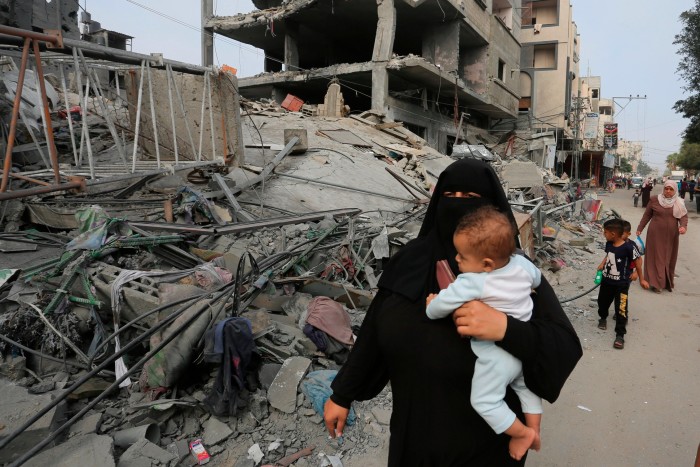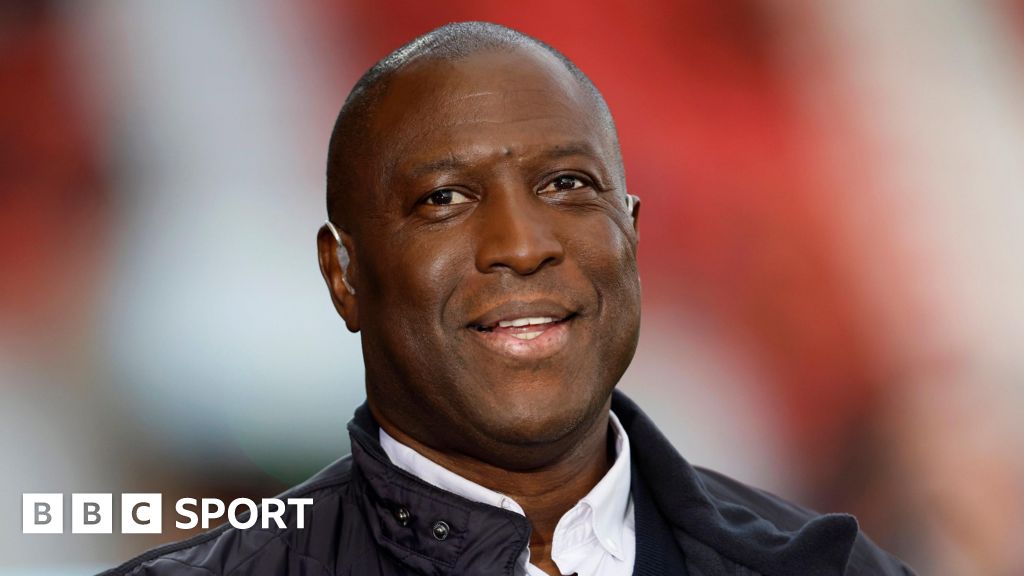Israel has pressed on with its ground offensive in Gaza for a second night as prime minister Benjamin Netanyahu said the country had launched a new phase of its “long and hard” war to destroy Hamas.
Many phone and internet connections were restored in Gaza on Sunday, two days after Israeli air strikes knocked out nearly all communications in the enclave, leaving many residents without contact to the outside world.
The disruption to the network came as a vanguard of Israeli forces advanced to hold multiple forward positions in Gaza’s territory. Dozens of tanks, accompanied by infantry and combat engineers, had “stabilised their defensive lines” inside the strip, military chief of staff Lieutenant General Herzi Halevi said on Saturday.
The ground operations were accompanied by what the UN described as the “most intense Israeli air strikes and artillery shelling” since the start of the war three weeks ago.
In a sign that the conflict risks spreading across the Middle East, the Iranian president Ebrahim Raisi said on social media platform X that Israel’s “crimes have crossed the red lines, which may force everyone to take action”.
At least 7,703 Palestinians have been killed in Gaza since the war began, according to the UN, citing information from the health ministry in the Hamas-controlled enclave. More than 1,400 people died in Israel when Hamas militants attacked villages and towns in the south during a raid on October 7, according to the government, with 229 being held hostage.
At a press conference in Jerusalem late on Saturday evening, Netanyahu described the conflict as a “war for Israel’s very existence”.
“We always said: ‘Never again’. Never again is now.”
But he stopped short of describing the military operations at the weekend as a full-scale invasion, saying only that Israel had decided to “expand ground operations” in Gaza and had sent “additional ground forces” into the enclave.
Dressed in black, he said it was the “second stage” of a war to destroy Hamas’s military and governmental capabilities and return the hostages being held by the militant group. “We’re just at the start,” he said.
Amos Yadlin, a retired general and ex-head of military intelligence, said that while the operations on Saturday were not the blitzkrieg many had predicted, they still marked the beginning of a long-signalled ground invasion to root out Hamas.
“It is inch by inch, metre by metre,” he said. “It is low-intensity conflict, and it started last night.”
In a video released by the IDF, Israeli tanks were shown operating along the Mediterranean Sea near its perimeter fence with the blockaded enclave, and massing in other locations. Hamas said it had engaged the Israeli military near Beit Hanoun, north of Gaza City.
Describing the air strikes on Saturday, Abu Mohamed, a resident of the al-Shati refugee camp on the Mediterranean coast, said: “What happened is beyond description. They killed families, children and women with air strikes, artillery shelling and from boats. They committed horrible massacres and cut off communications so no one would hear us.”
The International Committee of the Red Cross (ICRC) said thousands of families in Gaza were “sleeping in makeshift shelters or out in the open with little food and water”. It said hospitals were on the verge of collapse and wastewater plants were no longer functioning.
“I am shocked by the intolerable level of human suffering and urge the parties to the conflict to de-escalate now,” said Mirjana Spoljaric, ICRC president. “It is unacceptable that civilians have no safe place to go in Gaza amid the massive bombardments and with a military siege in place there is also no adequate humanitarian response currently possible.”
At a rally in Istanbul, Turkish president Recep Tayyip Erdoğan said that Hamas, which has political offices in Qatar and in Turkey, was “not a terrorist organisation . . . Israel is an occupier”.
“We will tell the whole world that Israel is a war criminal,” he told hundreds of thousands of supporters. Israel responded by pulling its diplomats out of Turkey.
The IDF said on Saturday that it had hit 150 Hamas targets, describing them as tunnels, combat spaces and underground infrastructure. It added that it had also killed Asem Abu Rakaba, believed to be head of the Hamas unit which launched paragliders in the October 7 attack on Israel.

Netanyahu faces a huge dilemma in stepping up the ground offensive in Gaza, with the families of hostages, whom the prime minister met on Saturday evening, warning that an invasion could endanger the lives of those still being held by Hamas.
“Any move considered [should] take into account the wellbeing of our loved ones,” said Meirav Leshem Gonen, the mother of 23-year-old Romi Leshem, who was snatched from a music festival.
But defence minister Yoav Gallant said on Saturday evening that continuing the campaign would put pressure on Hamas to release the hostages.
“We shouldn’t fool ourselves. Our enemies aren’t seeking a humanitarian solution,” he said. “As we hit Hamas harder, so the chances increase of [the militant group] reaching a point where it will agree to solutions that will return your loved ones.”
Hamas media groups quoted Yahya Sinwar, Hamas’s top leader in Gaza, as saying that the organisation was ready to release its hostages in return for Palestinian prisoners being held in Israeli jails.
But Daniel Hagari, an IDF spokesman, dismissed the offer as “psychological terror”. “It has one goal: to manipulate Israeli civilians,” he said.
Phillipe Lazzarini, the head of UNRWA, the UN agency that provides aid to Palestinian refugees, said public services and civil order in the territory, home to 2.3mn people, were collapsing.
Israel has blocked humanitarian aid from entering Gaza, allowing in only a few trucks each day that the UN and other agencies said were inadequate for the hundreds of thousands seeking refuge.
“Our aid operation is crumbling and for the first time ever, [UN staff] report that now people are hungry,” Lazzarini said.
Additional reporting by Mai Khaled in Rafah and Andrew England in London

Emily Foster is a globe-trotting journalist based in the UK. Her articles offer readers a global perspective on international events, exploring complex geopolitical issues and providing a nuanced view of the world’s most pressing challenges.








